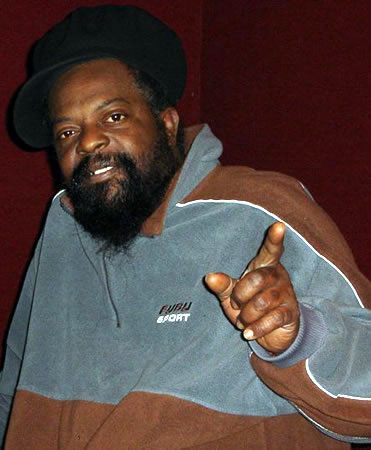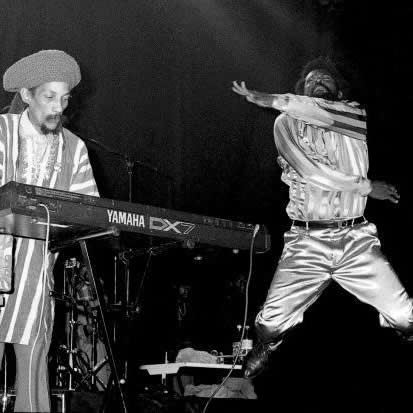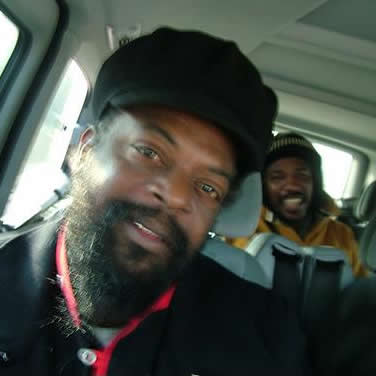
Junior Delgado
Junior Delgado was one of reggae’s most distinctive voices. His gruff, deep tenor held an anguished quality and, although the bulk of his catalogue dealt with rampant social injustices facing the global poor and the exploitative nature of world politics, he was equally convincing with romantic material, delivered in a rasping growl. Delgado was also close to many of reggae music’s most important innovators, making his contribution all the more influential in the music’s overall evolution.
Born Oscar Delgado Hibbert, he spent his early years in a crowded slum dwelling at Luke Lane, in the heart of downtown Kingston, where his mother worked as a dressmaker and his father as a building contractor; his uncle Lennie Hibbert was a vibraphonist and bandleader of the famed Alpha Boys School. After street violence escalated during the early 1960s, the family eventually settled on the outskirts of Kingston, where Junior Delgado met Orville Smith, Junior Marshall and Glasford Manning, with whom he formed the vocal harmony group Time Unlimited in 1973.
Time Unlimited were discovered by the eccentric producer Lee “Scratch” Perry, who was particularly struck by Delgado’s voice and motivated him to allow a more honest, raw and Jamaican expression. Although a number of songs were recorded for Perry, very little actually surfaced, so the group briefly moonlighted as the Heaven Singers.
As a solo singer, Delgado’s first local hit was “Reaction”, recorded for Perry in 1975; an alternative version, backed by the Wailers band, was popular on its release overseas, as was the religious “Really for a Reason” (both songs were credited on release to Junior Hibbert).
But it was “Tition”, a condemnation of the politically motivated violence then destroying Jamaica, that really helped establish his reputation; the song was produced by the guitarist Earl “Chinna” Smith and released by Dennis Brown, one of Delgado’s oldest and closest friends. “Sons of Slaves” was a landmark Lee Perry production, an examination of the legacy of slavery, while “Away With Your Fussing and Fighting”, produced by the visionary instrumentalist Augustus Pablo, was a riveting effort. Collaborations with the rhythm kings Sly and Robbie yielded the hits “Fort Augustus” and “Merry Go Round”.
Delgado’s début album, Taste of the Young Heart, was a compelling set that gained critical acclaim on its release in Britain in 1978; Effort (1979), the follow-up, was of near-comparable quality. As Delgado travelled between Jamaica and the UK, further albums followed, including Disco Style Showcase (1981) and Bushmaster Connection (1982).
In 1985 Delgado released “Broadwater Farm”, which predicted the riots that were shortly to ensue. Then came the captivating Raggamuffin Year (1986), produced by Augustus Pablo for Island Records, which brought Delgado to even greater heights of popularity; its follow-up, One Step More (1990), was also successful and live performances from the period, featuring Pablo, Delgado and his protégés Yami Bolo and White Mice were of a supremely high standard.
Delgado continued cutting strong material for labels such as Fashion and On-U Sound, and a Treasures Found series of retrospectives compiled by Colin Moore, of Fencebeater Records, helped maintain his fan base.
In the late 1990s, Junior Delgado briefly ran a north London record shop before opening the Incredible Music recording studio in Tooting, where he worked with upcoming talent as well as on his own material, including the recently completed album Invisible Music. He was a forthright, kind, and jovial man never afraid of speaking his mind.
Junior Delgado Died on April 10, 2005 in London, England.
Connect with JUNIOR DELGADO On SOCIAL MEDIA
Music Catalog
Beautiful music is the art that can calm the agitations of the soul. Music is healing. Music is one of the most magnificent and delightful presents of the creation. Take a sneak-peak and vibe on some great music in JD Music Catalog. And remember to sign up to our monthly newsletter.





